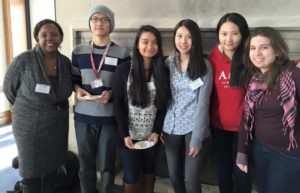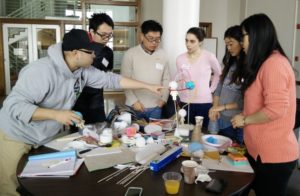While it’s safe to say that the majority of Clarkies went home or ventured to sandy beaches as a respite from studying and shivering here in Central Massachusetts, dozens of students participated in organized activities that allowed them to stay active, exercising their problem-solving skills and helping others during Spring Break.

The Clark University LEEP Center sponsored a LEEP Civic Challenge in partnership with the National Science Foundation-funded Art of Science Learning as one Alternative Spring Break option. This challenge allowed interested Clark undergraduate and graduate students to enhance their creativity, collaboration, problem-solving skills and capacities as they worked in teams to find creative opportunities and provide innovative solutions to a public health issue.
“It was remarkable to watch students from many disciplines and departments engaging with the arts while learning about some of the most complex STEM challenges. They worked collaboratively to sharpen their abilities to make a difference in the community of which they are a part,” said Clark Associate Provost and Dean of Research Nancy Budwig, who helped organize the opportunity.
Approximately twenty-five students participated in the LEEP Civic Challenge. Monica Marrone ’16, a biology major, was part of a group that focused on creating a STEM-based solution to help tackle the problem of obesity in Worcester.

“The process involved various creative and informative experiences such as using models to visually explore our ideas or listening to experts lecture about the problems,” said Marrone.
Marrone’s team ultimately created a technology-based invention that could be used in grocery stores to help close the information gap between the customer and food products; this invention helps to convey a particular item’s nutritional information to members of the at-risk population before purchase.
Eliana Hadjiandreou ’16, a psychology major, said that participating in the LEEP Civic Challenge provided her with a unique perspective on how art and science can be intertwined.

“I had a chance to understand innovation through practice, hone problem-solving skills, and make new friends,” she said. Including the word “challenge” in the title of the opportunity was fitting, however. “Coming up with a truly innovative idea is tough. Our team would have terrific ideas, only to realize soon after a Google search that someone else out there had the same notion and even acted on it. This made the task of innovating all the more challenging,” said Hadjiandreou. “Nevertheless, we realized that small tweaks to already-existing solutions could still bring about innovation and newness.”
“It was impressive to see how quickly the teams could work collaboratively to arrive at compelling solutions,” said Budwig.
In addition, over a dozen Clark University students recruited by Clark U Hillel joined four students from University of Vermont Hillel and traveled to Berlin, Germany to learn about Germany’s relationship with Jews and Judaism before and during the Holocaust and also about the Jewish community in Germany today.
Clark’s Community Engagement Office sponsored students who traveled to New York City and worked with Break A Difference, a Washington, D.C.-based organization that arranged for the group to volunteer at the Boys and Girls Club of Newark and at a food bank in Manhattan.

Ben Gardner ’12, coordinator of student programs & LEEP Center advisor, accompanied the group. In addition, seven members of Clark’s Global Student Embassy Club (GSE), a group affiliated with a non-profit organization in California that focuses on agricultural development and reforestation, traveled to Ecuador to participate in development projects around Bahía de Caráquez. The group was accompanied by Rich King, a doctoral candidate in biology.
The Clark team helped local schoolchildren plant hundreds of trees in an area that was once a thriving creek bed.
“We spent a few days camping on the beach in Bahía and several days learning about the culture and history of Ecuador in Quito,” said Celine Miranda ’17, vice president of the new student organization.
